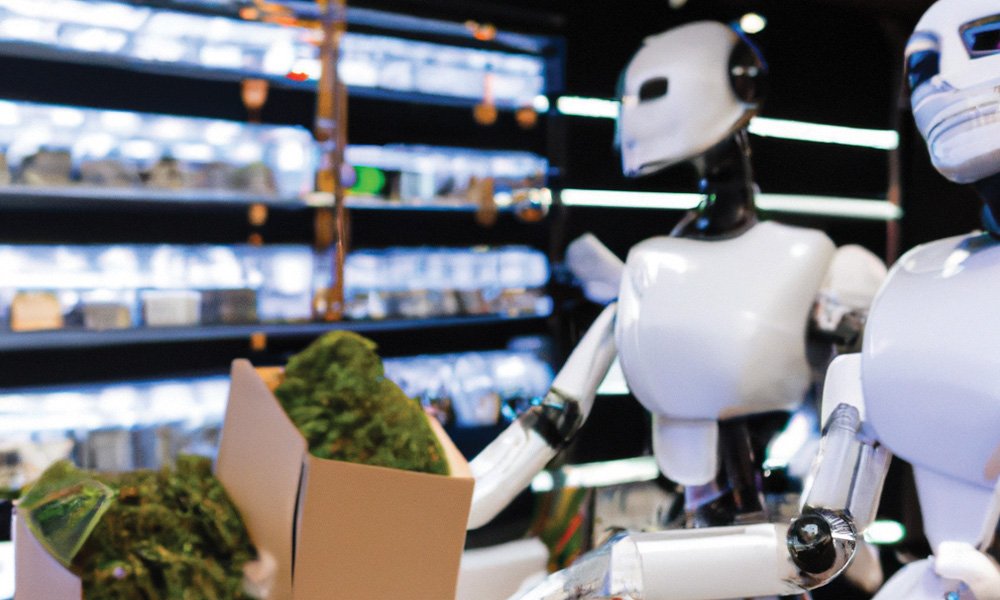We are approaching the 10th anniversary of Washington State and Colorado legalizing cannabis. This is a major milestone for the industry. It is no longer a small industry with only a few states. Cannabis for adult use has now been legalized by 24 states, plus DC. And states that were previously strongly proscribed have now legitimate medical marijuana programs. By 2023, the industry is expected to employ nearly 430 000 people. Its annual sales are estimated at nearly 32 billion dollars. The American cannabis industry is now entering this thrilling new frontier. Tech-savvy pot professionals might be wondering what impact artificial intelligence (AI), and its widespread use, will have on this quickly expanding industry.
AI systems could potentially assist in certain areas of the legal cannabis industry. A modern AI system, for example, could control perfectly the exact farming conditions and environment required to grow quality cannabis. A Chat GPT artificial intelligence could be used to serve as a budtender in a cannabis dispensary, and recommend similar products according to the preferences of consumers.
AI can streamline retail and manufacturing inventory. There are also many creative ways these systems can be utilized for marketing or sales. Artificial intelligence systems are able to help companies comply with all the regulations and rules that they have to follow.
Zeta Ceti is a professional who has spent nearly 30 years in the cannabis sector. She’s seen how cannabis businesses have implemented AI in a variety of practical ways. AI systems help cannabis businesses owners to organize and expedite the state-mandated tasks that are often tedious and stressful.
Ceti states, “AI has been used for many years in agriculture technology. It was also heavily utilized to optimize internal systems that are related to production. It’s no longer possible to work in the “old world” if you do not take advantage of generative AI for compliance documentation, such as SOPs or marketing. You can now speed up these processes because of the different technology levels available. “If business owners don’t use this system, then they are missing out on an opportunity to optimize and enhance their internal processes.”
Ceti says that AI-based systems will be used to conduct research and perform various dispensary tasks in the future. Gary Allen, CEO of New Frontier Data, also thinks artificial intelligence can be used in marijuana across multiple departments.
Allen says that AI is able to identify, from the growing process to the shelf of the retailer, the strains and products most likely to satisfy the consumer, based on a specific region or profile, or illness or result. As before, the answer to this question would be thousands of constructs for problems which in the old days took years to master. AI is capable of improving every aspect in this industry.”
Allen, New Frontier Data’s CEO, says that by using AI-based systems and machine learning, the company collects a large amount of information and creates detailed reports on cannabis sales, production, and manufacturing. Allen says that since the beginning, when he taught his platforms to use Machine Learning and NLP with AI to infuse data from different sources.
Green Rush Consulting’s Oddysee AI System, which was released earlier this year, may be a sign of AI’s future in the US Cannabis Industry. The system, which is multi-layered, uses a chatbot interface that was built using training data created by cannabis experts from all sectors of the industry. The interface, which was built from information and experience from cannabis professionals in the industry, will be able to provide precise responses for the various types of questions that users and employees may have.
Oddysee AI can help with a variety of aspects related to business operation and ownership.
Oddysee points out that “we’re able provide education, support and training on a self-service basis so customers can learn specifically from these processes.” It reduces the financial barriers to entry. This could help more applicants for social equity and in general, by not guaranteeing a license.
Ceti says that, due to the fact that AI is in its early stages, it will be important to leave room for errors, as this technology, and cannabis in general, are still developing.
Ceti says that it takes time before the AI can understand whether something is right or not. Therefore, you will have to correct things at first. The accuracy of the data will evolve over time.
There are concerns about the employment of humans versus automation in the cannabis industry. A system that can correctly respond to customer queries and provide appropriate advice could eventually replace the budtender. Ceti recommends companies adopt a proactive attitude to AI and the way that it will affect current business processes.
Ceti says, “It is all about optimization, refinement and how you empower your staff instead of cutting them.” Ceti says, “When we use that mentality in the way budtenders deal with their customers, I believe it will improve the experience for the customers so they are more knowledgeable by the time the reach the budtenders. The budtenders then can serve a greater number of customers more efficiently.”
Ceti stresses the vastness of potential futures that AI will bring. Boston Dynamics and other modern robotics companies are producing robots that can perform a variety of tasks. This means that the possibility of robotic cannabis trimming machines or packaging is not impossible. Cannabis-centric AI interfaces may be able to make medical or scientific discoveries regarding the plant, as federal legalization is only a matter time.
Ceti says, “I think AI plays an important role in cannabis.” Every role within the supply chain and in customer service, production, even scientific roles.
Cannabis is ready to be a part of the AI revolution, but the question remains: Are we?
This story was originally published in issue 49 of the print edition of Cannabis Now. Read it now on the Cannabis Now iTunes app.




